
Who Is to Blame When Fuel Prices Rise Dramatically?
Consumers do not think twice about slight fluctuations in fuel prices. But when prices go up dramatically, the finger-pointing starts. People need someone to blame. It is either fuel stations, distributors, or greedy oil companies looking to make excess profits off the backs of average consumers. But what is the real story? Can anyone be blamed when fuel prices rise dramatically?
It turns out the answer is a lot more complicated than you might think. There are a lot of players involved in getting crude oil out of the ground, processed, and into your tank as fuel. Each one plays a role in determining retail price. Furthermore, we consumers also influence pricing through our driving habits. When all is said and done, we all contribute to price fluctuations.
It Starts with Oil Futures
Determining the retail price of fuel starts with something known as oil futures. An oil future is essentially a contract to buy oil at a specified price on a specified date. That oil is purchased from petroleum companies who get it out of the ground or from under the seas. They sell oil by the barrel, meaning that your purchase of a futures contract would stipulate a certain number of barrels at a certain price.
The challenge with oil futures lies in speculation. Buying futures contracts is a lot like spread betting in the sense that investors really don't want to take delivery of the oil they are promising to buy. They buy contracts in hopes of selling them just before their settlement dates.
Let us say you purchase a contract for a thousand barrels at £100 per barrel and with a settlement date in 30 days. You speculate the price will actually be £120 when that date arrives. If you are right, you sell the day before and make a tidy profit. But if the price falls to just £80, you either have to take physical delivery of the oil or sell the contract at a loss.
Rapid Price Increases
Futures contracts are influenced by everything from economic news to political upheaval. That is why the retail price of fuel can go up so dramatically so quickly. If futures jump by a wide margin, everyone else in the supply chain has to plan to pay more. Their anticipated price increases are passed all the way down to the retail fuel pump.
The interesting thing is that other industries are affected by future price increases. Yet they don't respond so quickly because their products and services aren't purchased on speculation. That is what makes commodities like oil so unusual. The slightest fear of future market disruption can send prices skyrocketing overnight.
Refining Costs Fluctuate
Transforming crude oil into petrol and diesel requires refining. Refineries, irrespective of whether independently owned or operated by petroleum companies themselves, incur certain costs to do what they do. They have to pay to run their equipment. They have to pay for vehicles, storage, their facilities, and so on. Independent refineries also have to buy the crude they refine.
Refining costs fluctuate just like oil futures. They do not fluctuate as drastically, but fluctuate they do. Every price increase incurred by a refinery gets passed on to the distributor. By the time fuel gets to distribution, it has already been subjected to fluctuations at the first two levels of the supply chain.
Distributors Have To Make a Profit
Distributors are companies that buy fuel from refineries and ship it to retailers. Shipping can be handled by way of land-based pipelines or by utilising tanker ships, trains, and trucks. The largest distributors utilise multiple forms of transport. Each one incurs costs.
In order to make money, distributors add up all their costs and then add a bit extra on the top. Their costs include not only what they paid to purchase product, but also what they spend on transporting that product. Every truck burns fuel. So does every train and ship. That means distributors are directly affected by higher fuel prices even though they buy at lower distributor prices.
The Government Wants Its Cut
The last leg in the supply chain is the retailer. However, there is one more player who wants a piece of the pie: the government. It gets what it wants by levying taxes on retail sales. Taxes vary by jurisdiction, with the UK assessing taxes one way and the US assessing them another. No matter how you look at it though, a certain portion of the retail price for petrol consists of taxes.
The Retailer Sets Your Price
By the time a fuel retailer is ready to set their price, the fuel in their storage tanks has already been subjected to four previous pricing structures. It started with the price of crude based on futures contracts. Refineries added to it, as did distributors. Taxes rounded out the wholesale price the retailer paid.
How does the retailer set your price? First, by determining a minimum amount it can charge and still make money. The retailer has to make a bottom-line profit. Still, there is room for further price increases. This is where supply and demand comes into play. It is also where you and I contribute to the price of fuel.
Retailers charge higher prices during periods of high demand. When everybody wants petrol, petrol stations can charge more. On the other hand, they drop their prices when consumers don't buy as much. They would rather sell more fuel at a lower price than let it sit in their tanks and not generate revenue.
One last thing to note is that petrol stations pay attention to the prices set by their competitors. Daily price surveys provide a benchmark retailers can start with when setting their own prices. That is why you will see so many petrol stations within the same general area setting very similar price points.
It is a Chain Reaction
It's easy to point fingers at the oil companies when fuel prices rise dramatically. It is easy to accuse retailers of price gouging. But what really happens is that oil futures start a chain reaction that eventually end at the retail level. When speculators pay higher prices for fuel contracts, everyone down the line pays a higher price too.
No single entity is to blame. Every participant – from oil company to consumer – contributes to determining prices.


